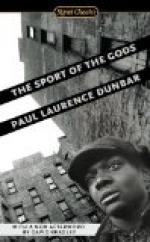“Well, do you think there ’s any doubt of the darky’s guilt?” asked Colonel Saunders hesitatingly. He was the only man who had ever thought of such a possibility. They turned on him as if he had been some strange, unnatural animal.
“Any doubt!” cried Old Horace.
“Any doubt!” exclaimed Mr. Davis.
“Any doubt?” almost shrieked the rest. “Why, there can be no doubt. Why, Colonel, what are you thinking of? Tell us who has got the money if he has n’t? Tell us where on earth the nigger got the money he ’s been putting in the bank? Doubt? Why, there is n’t the least doubt about it.”
“Certainly, certainly,” said the Colonel, “but I thought, of course, he might have saved it. There are several of those people, you know, who do a little business and have bank accounts.”
“Yes, but they are in some sort of business. This man makes only thirty dollars a month. Don’t you see?”
The Colonel saw, or said he did. And he did not answer what he might have answered, that Berry had no rent and no board to pay. His clothes came from his master, and Kitty and Fannie looked to their mistress for the larger number of their supplies. He did not call to their minds that Fannie herself made fifteen dollars a month, and that for two years Joe had been supporting himself. These things did not come up, and as far as the opinion of the gentlemen assembled in the Continental bar went, Berry was already proven guilty.
As for the prisoner himself, after the first day when he had pleaded “Not guilty” and been bound over to the Grand Jury, he had fallen into a sort of dazed calm that was like the stupor produced by a drug. He took little heed of what went on around him. The shock had been too sudden for him, and it was as if his reason had been for the time unseated. That it was not permanently overthrown was evidenced by his waking to the most acute pain and grief whenever Fannie came to him. Then he would toss and moan and give vent to his sorrow in passionate complaints.
“I did n’t tech his money, Fannie, you know I did n’t. I wo’ked fu’ every cent of dat money, an’ I saved it myself. Oh, I ’ll nevah be able to git a job ag’in. Me in de lock-up—me, aftah all dese yeahs!”
Beyond this, apparently, his mind could not go. That his detention was anything more than temporary never seemed to enter his mind. That he would be convicted and sentenced was as far from possibility as the skies from the earth. If he saw visions of a long sojourn in prison, it was only as a nightmare half consciously experienced and which with the struggle must give way before the waking.
Fannie was utterly hopeless. She had laid down whatever pride had been hers and gone to plead with Maurice Oakley for her husband’s freedom, and she had seen his hard, set face. She had gone upon her knees before his wife to cite Berry’s long fidelity.
“Oh, Mis’ Oakley,” she cried, “ef he did steal de money, we ’ve got enough saved to mek it good. Let him go! let him go!”




